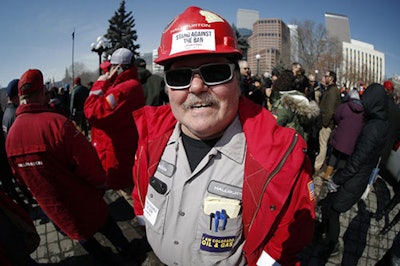
 Audrey Carlson of Denver waves a placard during a rally outside the State Capitol Tuesday, March 5, 2019 in opposition of lawmakers' plan to advance a bill to overhaul the state's oil and gas regulations. (AP Photo/David Zalubowski)
Audrey Carlson of Denver waves a placard during a rally outside the State Capitol Tuesday, March 5, 2019 in opposition of lawmakers' plan to advance a bill to overhaul the state's oil and gas regulations. (AP Photo/David Zalubowski)A plan to refocus Colorado's oil and gas regulations on health and safety passed its first milestone in the Legislature on Wednesday after 187 people testified during a 12-hour hearing.
The Senate Transportation and Energy Committee voted 4-3 to approve a measure that would require regulators to make the protection of human health and the environment their top priority. Current law makes energy production the primary goal.
The legislation also gives local governments the option of regulating the location of new wells. Existing law says only the state has that authority.
All the panel's Democrats supported the measure and all the Republican members opposed it. Democrats control both houses of the Legislature, and Democratic Gov. Jared Polis has endorsed the measure.
Democratic Senate Majority Leader Stephen Fenberg, a bill co-sponsor, said it is a common-sense approach to dealing with frequent conflicts over drilling, especially in fast-growing communities north of Denver, which overlap the rich Wattenberg oil and gas field.
Opponents say it could lead to a virtual ban on drilling in some areas and cost jobs.
They got a boost Wednesday from Ken Salazar, one of Colorado's Democratic elder statesmen and a former U.S. senator and Interior Department secretary.
 Frank Deshane of Brighton, Colo., takes part in a rally outside the state Capitol in Denver on Tuesday, March 5, 2019, in opposition of lawmakers' plan to advance a bill to overhaul the state's oil and gas regulations. (AP Photo/David Zalubowski)
Frank Deshane of Brighton, Colo., takes part in a rally outside the state Capitol in Denver on Tuesday, March 5, 2019, in opposition of lawmakers' plan to advance a bill to overhaul the state's oil and gas regulations. (AP Photo/David Zalubowski)Salazar said the measure would give local governments "unfettered" authority over the location of new wells and allow them to effectively ban drilling.
In a written statement, Salazar said Colorado's oil, gas and renewable energy is important to national security because it helps keep the country from depending on other nations.
Salazar, an attorney, is now in private practice and works for oil, gas and renewable energy companies.
His statement, also published as an op-ed in The Denver Post, said he understands the need to reform the rules, especially on health and safety, but he called the legislation "too extreme" for Colorado.
Salazar was a U.S. senator from 2005 to 2009 and interior secretary under former President Barack Obama from 2009 to 2013.
Nearly 400 people signed up to testify before the Transportation and Energy Committee hearing in person or by video from a half-dozen sites around the state. By the time the hearing ended, about half spoke—101 in favor of the changes and 86 against them.
The committee made five minor changes to the legislation.
The next stop is a hearing Thursday before the Senate Finance Committee. Fenberg said the bill could go through six hearings before final votes in the House and Senate.






















